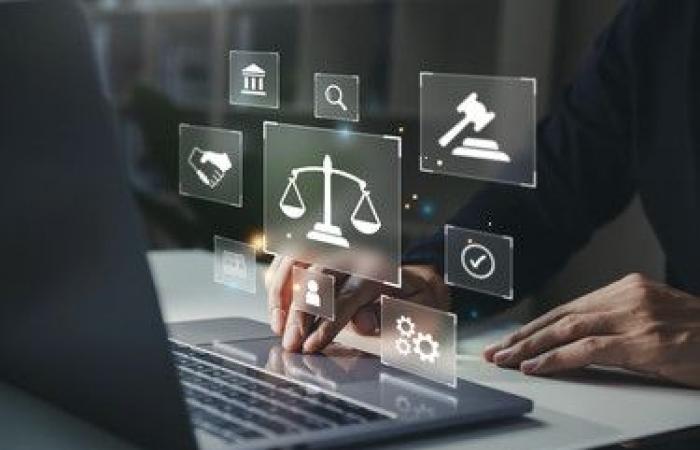In the space of two years, lawyers have seen their working methods evolve at an unprecedented pace. The adoption of tools fueled by artificial intelligence jumped: almost 80 % of professionals in the sector used them in 2024, against less than 20 % a year earlier. Faced with the surge, the legal world oscillates between concern and enthusiasm.
Automation: A risk for lawyers?
Many Repetitive legal tasks are now available to automation via AI. Search for case law, drafting of standardized contracts, analysis of large documents … So many missions formerly entrusted to collaborators or junior lawyers, now achievable by means of an algorithm in a few seconds.
According to a study by the Goldman Sachs bank, relayed in a report by the French Senate, 44 % of legal tasks in the United States are automatizable.
From the point of view of young lawyers, the fear of a decrease in hires is real. An artificial intelligence can screech thousands of pages in record time. Lawyers’ firms are likely to restrict the recruitment of assistants responsible for re -reading documents, basic research …
On the independent side, competition is also likely to intensify. Instead of calling a professional, client companies can now use online platforms or AI for simple needs such as:
- The generation of documents or standard contracts.
- General legal advice.
- The verification of regulatory compliance of internal documents …
Jurists: Towards an evolution of invoicing on time?
The potential for automating legal AI threatens the traditional economic model of the sector. 60 % of law professionals anticipate the possible questioning of the principle of hourly invoicing due to the efficiency gains linked to AI.
Legal ia: already perceptible productivity gains
In return for the threat represented, AI brings lawyers to unpublished efficiency to lawyers. A law professional can in particular rely on an algorithm in the context:
- A contract rereading.
- A summary of large files.
- Translation of legal texts …
The first feedback from the field are encouraging. THE notaries Consider being able to reduce the average duration of a file by 90 minutes: the drafting of a contract would thus take half the time.
Several innovative platforms have already emerged on the French market. The platform Genia-ldeveloped by Lefebvre Dalloz, generates in a few seconds of the summaries of jurisprudence in order to refer the lawyers. Overpayoften presented as the “law chatgpt”, promises to automate up to 80 % of repetitive tasks in the office.
Towards better access to law for companies – and citizens
Artificial intelligence also augurs for justice plus accessible. Via the automation of basic tasks, AI opens new horizons to lawyers. They are able to respond faster to requests, without sacrificing the quality of the relationship with their customers.
The senatorial information report of December 18, 2024 abounds in the same direction. The gain in productivity generated, in the long term, should allow legal professionals:
- To treat ” More files ».
- To accompany a ” larger number of litigants ».
- To provide a ” popularized legal information ».
The democratization of the Council by AI, however, requires precautions. In the United States, around 31 % of customers are reluctant to consult a law firm assisted by AI. Automated responses not supervised may lack nuance, or even represent a heavy legal risk. AI is brought to remain a tool for the lawyer, not a substitute.
Lawyers facing AI: new roles to develop
Instead of signing the end of the legal professions, AI is likely to make them evolve. Released from certain repetitive tasks, lawyers and lawyers are free to focus on strategic advice, negotiation, argument … so many dimensions with high added value, where human intelligence retains a clear advantage.
In parallel, new hybrid profiles are emerging. THE Data lawyersfamiliar with the IT code as well as the Civil Code, represent a new rare pearl appreciated in companies.
The transformation is also reflected in the organization of firms, which has been recruiting experts to control transformation projects. Legaltech specialists, data analysts… 72 % of law professionals consider AI of a positive eye for their profession.
AI is not intended to replace the eminently human dimension of law. Jurists capable of integrating it into their professional practices give themselves the best ways to take advantage of the current revolution.
The 3 key points to remember
- AI automated many legal tasks. It can question the viability of certain jobs at low level of competence.
- It offers in return for considerable time gains, improves access to law for all.
- Legal professions are brought to evolve towards greater specialization.
Sources :
https://www.lawnext.com/2024/10/ai-adoption-by-legal-professionals-jumps-from-19-to-79-in-one-year-clio-study-finds.html
https://www.senat.fr/rap/r24-216/r24-21614.html
https://www.wolterskluwer.com/fr-be/know/future-ready-lawyer-2024
https://ordalie.ai/fr
https://legal.thomsonreuters.com/blog/how-ai-is-transforming-the-legal-profession/








